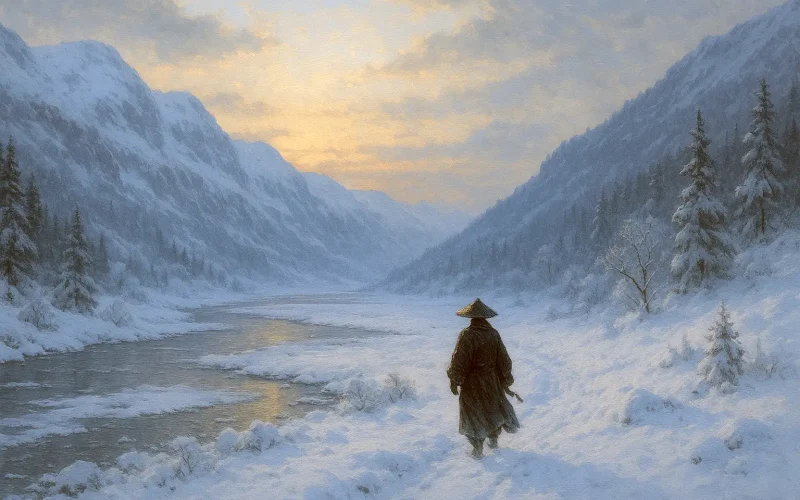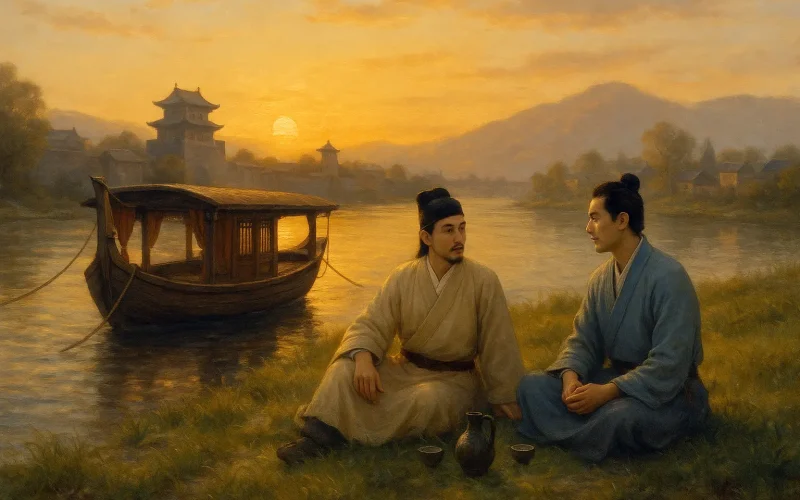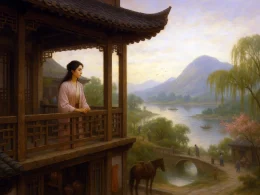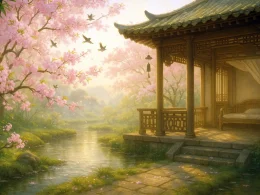A morning-rain has settled the dust in Weicheng;
Willows are green again in the tavern dooryard...
Wait till we empty one more cup --
West of Yang Gate there'll be no old friends.
Original Poem
「渭城曲」
王维
渭城朝雨邑轻尘,客舍青青柳色新。
劝君更尽一杯酒,西出阳关无故人。
Interpretation
Composed during Emperor Xuanzong's Tianbao era (742-756 AD), this poem captures Wang Wei's farewell to his friend Yuan Er, who was departing for the Anxi Protectorate (modern Kuqa, Xinjiang). Set at Weicheng (near present-day Xi'an)—a vital gateway to the Western Regions—the work distills friendship and parting sorrow into morning spring scenery and a single wine toast, creating an unparalleled masterpiece of farewell poetry that resonates across millennia.
First Couplet: "渭城朝雨浥轻尘,客舍青青柳色新。"
Wèi chéng zhāo yǔ yì qīng chén, kè shè qīng qīng liǔ sè xīn.
Morning rain in Weicheng dampens light dust;
Willows by the inn glow fresh and green.
This couplet establishes the parting scene with natural elegance. The "morning rain" (朝雨) operates both literally and symbolically, its gentle melancholy contrasting with the vibrant "fresh willows" (柳色新)—a departure from conventional farewell poems' gloom. The delicate moisture ("dampens light dust") and rejuvenated colors construct a luminously tender backdrop for separation.
Second Couplet: "劝君更尽一杯酒,西出阳关无故人。"
Quàn jūn gèng jìn yī bēi jiǔ, xī chū Yáng guān wú gù rén.
"Drink one more cup of wine, my friend—
West of Yang Pass, you'll meet no old acquaintances."
The emotional core erupts through deceptive simplicity. Avoiding overt sorrow, Wang Wei concentrates infinite parting weight into a wine toast. "Yang Pass" (阳关) transforms from geographic marker to existential threshold—the point of no return where familiar bonds dissolve. The imperative "drink" (尽) vibrates with unspoken affection, while "no old acquaintances" (无故人) echoes with the loneliness of westward expanses.
Holistic Appreciation
In just four lines, Wang Wei orchestrates a masterclass in emotional compression. The opening couplet's spring freshness (rain-washed willows, cleansed air) sets a stage where parting feels simultaneously inevitable and suspended in crystalline beauty. The shift to direct address in the latter couplet detonates this tranquility with human urgency—a single cup of wine containing oceans of unvoiced care. Unlike typical farewell poems' protracted laments, Wang Wei's power derives from restraint: every image serves dual duty as description and metaphor, every word vibrates at emotional frequency. The result transcends temporal context to touch the universal nerve of separation.
Artistic Merits
The poem's most outstanding artistic feature lies in its scene-inspired opening and word-perfected emotion. Wang Wei employs imagery like "morning rain," "light dust," and "willow hues" to craft a transient tranquility before parting, evoking the poignant limbo between departure and lingering. This atmospheric prelude culminates in the direct emotional outburst of "Drink one more cup of wine"—where farewell sentiments erupt with concentrated intensity.
With lucid brevity and implicit depth, the language embodies Wang Wei's signature aesthetic of "understated naturalness." Simultaneously, the poem showcases his mastery of "painting through poetry"—its composition unfolds like an ethereal morning farewell scroll, where every brushstroke resonates with quiet profundity.
Insights
Wang Wei's poem teaches that profound communication thrives on disciplined generosity—the art of giving maximum emotional payload through minimal utterance. In our era of constant connection yet frequent isolation, this Tang dynasty farewell reminds us: true presence isn't measured by word count, but by attention's density. The "one more cup" becomes an eternal gesture—how might we, too, distill care into singular, perfect acts?
Poem translator
Kiang Kanghu
About the poet

Wang Wei (王维), 701 - 761 A.D., was a native of Yuncheng, Shanxi Province. Wang Wei was a poet of landscape and idylls. His poems of landscape and idylls, with far-reaching images and mysterious meanings, were widely loved by readers in later generations, but Wang Wei never really became a man of landscape and idylls.












